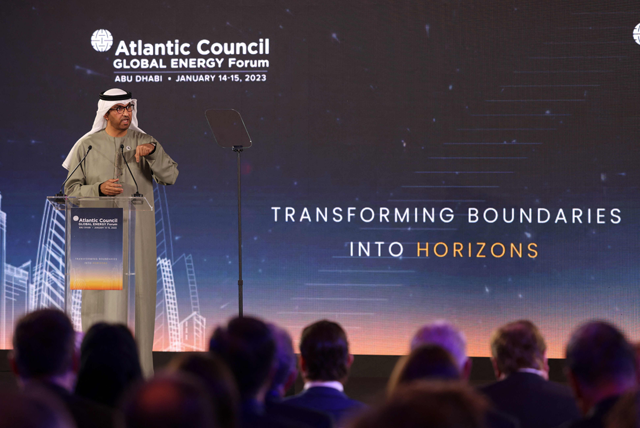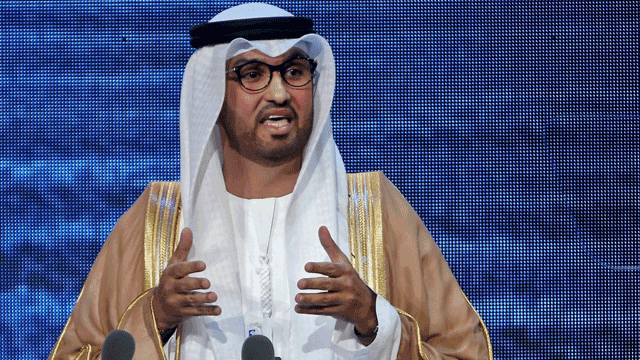You are here
Focus on emissions, says UAE's climate talks and oil boss
By AFP - Jan 14,2023 - Last updated at Jan 14,2023

United Arab Emirates' Minister of State and CEO of the Abu Dhabi National Oil Company (ADNOC) Sultan Ahmed Al Jaber, addresses the public at the opening session of the Atlantic Council Global Energy Forum, in the capital Abu Dhabi, on Saturday (AFP photo)
ABU DHABI — The president of this year's COP28 climate talks, who heads a major oil company, on Saturday urged a focus on lower emissions to reduce global warming, warning that energy needs were set to accelerate.
Sultan Al Jaber, the United Arab Emirates' special envoy for climate change and CEO of oil giant ADNOC, said less-polluting fossil fuels would remain part of the energy mix, along with renewables and other solutions.
"As long as the world still uses hydrocarbons, we must ensure they are the least carbon intensive possible," Al Jaber told the Global Energy Forum in Abu Dhabi, two days after his unveiling as COP president.
"We're working with the energy industry on accelerating de-carbonisation, reducing methane and expanding hydrogen.
"Let's keep our focus on holding back emissions, not progress."
Al Jaber's nomination on Thursday prompted protests from climate activists concerned that a senior figure from the oil industry has little incentive to reduce the use of hydrocarbons.
The Gulf monarchy argues that oil remains indispensable to the global economy and is pushing the merits of carbon capture — removing carbon dioxide, the main greenhouse gas, as fuel is burned or from the air.
Al Jaber said the UAE would organise this year's United Nations climate summit with "humility, a clear sense of responsibility and a great sense of urgency".
He said the world's population, currently eight billion, was on course to reach 9.7 billion by 2050 and would need "50 per cent more energy than what is available today".
'Living in a dream'
"We are way off track. The world is playing catch up when it comes to the key Paris goal of holding global temperatures down to 1.5 degrees [Celsius]," he said.
"And the harsh reality is that in order to achieve this goal, global emissions must fall 43 per cent by 2030."
COP27, held in Egypt in November, concluded with the adoption of a hotly contested text on aid to poor countries affected by climate change, but failed to set new ambitions for lowering greenhouse gas emissions.
The UAE, a leading crude producer and one of the world's biggest polluters per capita, will host the next edition in Dubai in November and December. It had the largest contingent of oil and gas lobbyists at last year's talks.
At the Global Energy Forum, whose audience included US climate envoy John Kerry, Qatar's Energy Minister Saad Sherida Al Kaabi accused critics of "demonising" oil and gas companies.
"If I can just be a little bit blunt... the community that was driving the green [agenda] was living in a dream that they realise they can't achieve," said Kaabi, who is also the chief executive of state gas firm QatarEnergy.
"It's very important that we achieve these goals but we need to be realistic about what we can achieve," he added. "We can't be driven by just the agendas of people wanting to be elected."
Products as varied as coolers and clothing rely on hydrocarbons, Kaabi said. "I know we need to do a lot of work there but let's not forget the reality of what we need."
Related Articles
BENGALURU — The energy industry must play a role in the campaign to tackle global warming, the president of this year's UN climate talks sai
ABU DHABI — The fight against global warming should not be at the expense of economic growth, the UAE oil chief who will lead this year's UN
WASHINGTON — The United States announced a clean energy partnership on Tuesday with the United Arab Emirates worth $100 billion, the White H


















